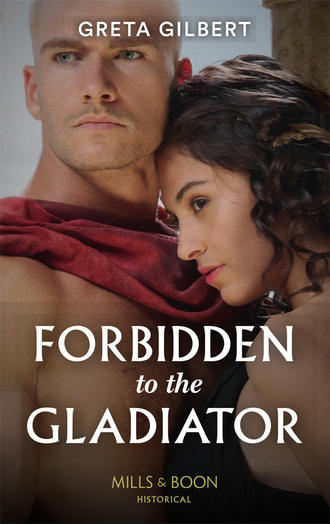
Полная версия
Forbidden To The Gladiator

He’ll fight to the death
She’ll fight to save him!
When her father wagers her hard-earned money on a gladiator battle—and loses!—Arria is forced into slavery, just as trapped as the gladiator she blames for her downfall, rugged Cal. She’s furious, yet also captivated by their burning attraction.
Cal’s past has made him determined to die in combat, but can Arria give her forbidden warrior something to live for…and a reason to fight for their freedom?
“The engaging characters, impossible situation, and the power exchange between master and slave will have readers up past their bedtime.”
—RT Book Reviews on In Thrall to the Enemy Commander
“Singing with atmosphere and with scholarship, In Thrall to the Enemy Commander gives us an enigmatic heroine who fascinates at every turn, and immerses us fully in a world long-gone, but wonderfully-conjured.”
—Romantic Intentions Quarterly on In Thrall to the Enemy Commander
GRETA GILBERT’s passion for ancient history began with a teenage crush on Indiana Jones. As an adult she landed a dream job at National Geographic Learning, where her colleagues—former archaeologists—helped her learn to keep her facts straight. Now she lives in South Baja, Mexico, where she continues to study the ancients. She is especially intrigued by ancient mysteries, and always keeps a little Indiana Jones inside her heart.
Also by Greta Gilbert
Mastered by Her Slave
Enslaved by the Desert Trader
The Spaniard’s Innocent Maiden
In Thrall to the Enemy Commander
Discover more at millsandboon.co.uk.
Forbidden to the Gladiator
Greta Gilbert

www.millsandboon.co.uk
ISBN: 978-1-474-07432-2
FORBIDDEN TO THE GLADIATOR
© 2018 Greta Gilbert
Published in Great Britain 2018
by Mills & Boon, an imprint of HarperCollinsPublishers 1 London Bridge Street, London, SE1 9GF
All rights reserved including the right of reproduction in whole or in part in any form. This edition is published by arrangement with Harlequin Books S.A.
This is a work of fiction. Names, characters, places, locations and incidents are purely fictional and bear no relationship to any real life individuals, living or dead, or to any actual places, business establishments, locations, events or incidents. Any resemblance is entirely coincidental.
By payment of the required fees, you are granted the non-exclusive, non-transferable right and licence to download and install this e-book on your personal computer, tablet computer, smart phone or other electronic reading device only (each a “Licensed Device”) and to access, display and read the text of this e-book on-screen on your Licensed Device. Except to the extent any of these acts shall be permitted pursuant to any mandatory provision of applicable law but no further, no part of this e-book or its text or images may be reproduced, transmitted, distributed, translated, converted or adapted for use on another file format, communicated to the public, downloaded, decompiled, reverse engineered, or stored in or introduced into any information storage and retrieval system, in any form or by any means, whether electronic or mechanical, now known or hereinafter invented, without the express written permission of publisher.
® and ™ are trademarks owned and used by the trademark owner and/or its licensee. Trademarks marked with ® are registered with the United Kingdom Patent Office and/or the Office for Harmonisation in the Internal Market and in other countries.
www.millsandboon.co.uk
For my beautiful sister,
who has finally found her happily-ever-after.
Contents
Cover
Back Cover Text
About the Author
Booklist
Title Page
Copyright
Dedication
Chapter One
Chapter Two
Chapter Three
Chapter Four
Chapter Five
Chapter Six
Chapter Seven
Chapter Eight
Chapter Nine
Chapter Ten
Chapter Eleven
Chapter Twelve
Chapter Thirteen
Chapter Fourteen
Chapter Fifteen
Chapter Sixteen
Chapter Seventeen
Chapter Eighteen
Chapter Nineteen
Chapter Twenty
Chapter Twenty-One
Chapter Twenty-Two
Chapter Twenty-Three
Chapter Twenty-Four
Chapter Twenty-Five
Chapter Twenty-Six
Chapter Twenty-Seven
Chapter Twenty-Eight
Chapter Twenty-Nine
Chapter Thirty
Extract
About the Publisher
Chapter One
City of Ephesus—west coast of modern Turkey—Roman Empire—AD 99
There were two kinds of Roman men: the ones who lived in search of Gloria and the ones who lived in search of bona fortuna. Arria’s father was the second kind. No matter what family crisis or holy ritual, what call of duty or act of the gods, nothing could keep him from the fighting pits and that was where she found him the night he sold her freedom.
‘No women allowed,’ growled the guard, standing at the entrance to the pit-viewing area. ‘Unless you want to do me a favour?’ He gave himself a rude scratch, then flashed Arria a wine-stained grin.
‘Go to Hades,’ she told him, and in the split second of his astonishment she slipped past him into the rollicking crowd. There must have been two hundred men gathered on the slope before her—portly merchants and seafaring traders, oily-haired plebeians and watchful freedmen, even a smattering of patricians—all vying for position around the large gladiator training pit known as the Chasm of Death.
Arria scanned the men’s torchlit faces, searching for her father. She told herself that it was possible he was not here at all. There was a chance that he had been on his way to the fighting pit that evening and been struck by a bolt of reason.
I am an honourable pater familias, Arria imagined him realising. I should not continue risking my family’s survival on the uncertainties of bets.
Arria almost laughed. As if her father were capable of such Aristotelian logic! No, he was here, as was every other corrupt gambler in the province. The fighting pits of Ephesus were as popular as they were bloody and the Chasm of Death was the largest and bloodiest of them all. The only hope now was for Arria to find her father and seize his purse before the damage was done.
A shell horn moaned. A ringmaster’s voice resounded from below. He was introducing the next set of gladiators—a Dacian and a Berber, whose heights and weights he announced first in Latin, then in Greek. Nearby, a Jewish man echoed the information in Aramaic and Arria thought she heard someone say it again in the Armenian tongue. Second only to Alexandria in influence, Ephesus was the most important commercial centre outside of Rome—a place where people from every corner of the world gathered to live and trade. They spoke different languages and worshipped different gods, though Arria doubted any kind of god was present in this bloody place.
Keeping out of the torchlight, she stalked along the edge of the crowd in search of her father’s stooped form.
The fight below commenced. Arria could hear the metallic clang of weapons and the grunts of effort as the gladiators began their bloody brawl. The Chasm of Death was the training ground of Ephesus’s largest gladiator school and several times a year its owner, Brutus, would invite spectators to place their bets on fights between old or unpromising gladiators in an effort to clean out his stock.
It was a twisted, bloody business and one which the idle and desperate men of Ephesus looked forward to with perverse joy. Arria calculated that her father had lost enough denarii at the pits over the years to equal the cost of a herd of goats, or a fine fishing vessel.
But tonight he had reached a new low. He had seized a purse full of denarii that did not belong to him: Arria’s purse, the purse that contained the denarii that would see their family through the winter.
Arria pushed deeper into the crowd and nearer to the pit’s perimeter. ‘First blood to the Dacian!’ someone shouted. Men cheered and grumbled. Coins changed hands. Someone smashed a wine flagon against a slab of stone.
‘Where are you, Father?’ Arria mumbled, feeling a little dizzy.
She felt a large hand push against her back. ‘Move yourself, boy.’ A man in a purple-trimmed toga brushed past Arria, his eyes sliding to the small bump of her bosom. He paused. ‘What is this?’ He yanked her braid out from beneath her tunic. ‘A woman? At a fighting pit?’
Arria stared into his kohl-rimmed eyes, too stunned to speak. She knew the man’s face: the bent nose, the high cheeks, the oil-soaked hair, combed into perfect rows. She had seen it carved on statues and sketched on walls from the cities of Miletus to Pergamon. ‘Proconsul Governor Secundus?’
‘You are under arrest, woman. Your presence here is an affront to Mars and a disgrace to feminine honour. Lictor!’ He motioned to a bodyguard somewhere behind her.
The governor of the province? At a fighting pit? How was it possible? More importantly, what was she to do? She needed to find her father. It was September already. Fortuna alone would not keep Arria’s family warm and alive through the cold, bleak months to come.
She lurched her braid free from the governor’s grasp and attempted to run, but he caught her by the arm. His bodyguard drew closer.
‘I must go!’ Arria burst out. There was no time to explain. There was no time to even think. There was only her heel slamming down atop the governor’s foot and her teeth burying themselves into the flesh of his gripping hand.
‘Ow!’ the governor howled.
Oh, gods, what had she done? She unlocked her jaws and, as he recoiled in pain, she was able to detach herself from the most powerful man in Ephesus.
‘Little asp!’ he shouted behind her. ‘Lictors!’
A death bellow resonated from the pit below and the crowd erupted in celebration. Seizing on the chaos, Arria tucked her braid beneath her tunic and ducked low, losing herself in the crush of bodies.
Horror rioted through her. Had she really just bitten into the flesh of Proconsul Quintus Vibius Secundus, the venerable governor of the Roman province of Asia?
‘Prepare yourselves my fellow Romans,’ chimed the ringmaster, ‘for in this next bout, limbs will be hewn and innards strewn. I give you the Ox of Germania versus…’
Arria was caught in a sudden rush of movement. She was pulled, then pushed, then pressed backwards. Dizzy and fumbling for balance, she turned to find herself staring down at the blood-spattered sand at a bald, muscle-bound man in a rabbit-skin kilt.
‘The Beast of Britannia!’ shouted the ringmaster.
The barbarian gladiator raked his gaze over the crowd and for a moment his eyes locked with Arria’s. Startled, Arria stepped backwards. She had never seen such eyes. They were neither green nor brown, but some indescribable colour that seemed to change with each flicker of torchlight. Incredibly, she did not feel fear, though she was aware she was being appraised by a killer. It was something else she felt. Something strange. It was as if her breath had become stuck in her chest.
A second later, the ringmaster stepped in front of the man and the spell was broken.
‘Barbarian versus barbarian!’ the ringmaster cried. ‘Place your bets!’
The cacophony increased as the spectators conferred, staking their fortunes on one gory outcome or the other. ‘The Beast is the obvious choice,’ someone near Arria pronounced.
‘Agreed,’ said another. ‘I do not understand why Brutus has put him in the ring. He is one of the Empire’s finest.’
‘He is old now. His days are numbered,’ said a third. ‘Besides, look at the chest on the Ox. They have fattened him.’
The men might have been discussing fighting cocks, or horses for sale.
‘I say the Beast will prevail!’ said the first. He nudged the back of Arria’s shoulder. ‘What say you, man?’
‘Piss off,’ Arria grumbled, keeping her back to the men and feeling thankful for the low light. Besides, she had nothing to say, no opinion to profess. She did not find any of this interesting, exciting or even vaguely human.
Still, there was something about the gladiator’s name that rang familiar. The Beast of Britannia. Where had she heard it before? Probably at the baths. Women were always talking about gladiators at the baths. They spent endless hours discussing the fighters’ looks and conjecturing about the size of their…weapons. Even if he were not famous, a gladiator with a name like the Beast would never have been safe from their gossip.
Nor was he safe from death, for he wore no armour and was protected only by symbols—haunting blue swirls that had been painted across his chest.
His opponent was scarcely better off. The thick-chested Ox stood on the other end of the arena in a skirt of leather straps and little else.
She wondered if either of the men had any idea how thoroughly they were being mocked. The gladiators who fought and died at the circuses and amphitheatres wore at least light armour—helmets and shields and usually manicae for the arms, depending on the roles they played.
Gladiators skilled enough to perform at theatres were issued additional protections, including greaves to protect their shins and, depending on their assigned role, chest plates. These men did not even don sandals.
Arria gazed down at her own sandals. She had almost worn through the soles. Not that her father would have cared. When she looked up, she caught sight of him at last. He was nodding his head in conversation with a barrel-chested man just across the pit. She motioned with her arms, trying to get her father’s attention, though she could tell by the tightness in his jaw that it was already too late.
The bet had been made. Arria’s savings had been staked. Now there was nothing to do but pray. Arria gazed down at the two hulking barbarians standing in the arena below. But pray for whom?
Two slaves emerged from a tunnel and delivered the gladiators their swords. ‘Die well, gladiators!’ said the ringmaster, then followed the slaves back into the tunnel, closing an iron gate behind them.
For a moment, all was silent.
The Ox of Germania sliced the air with his sword. He danced towards the centre of the ring, feinting and jabbing to the encouragement of his supporters.
The Beast of Britannia was more circumspect. He skulked along the curved stone wall of his own side of the ring, watching the Ox with those bottomless eyes.
Arria saw her father’s lips moving. He was praying to Fortuna herself, no doubt, the goddess who so often wiped her feet with his toga.
The gladiators drew closer. Taunts rained down from the crowd along with a cascade of obscenities in a variety of tongues. The Ox lunged; the Beast dodged. A path of blood streaked across the Beast’s chest. ‘First blood to the Ox!’ someone shouted. A smattering of cheers. The changing of coins.
The Beast was bleeding. Arria had never seen such a terrible gash. It began at the tip of his shoulder and split his muscled chest diagonally, concluding at the thick arc of muscle at the top of his hip.
Arria was not the only one stunned by the wound. The Beast himself appeared utterly perplexed by it, as if he had never suffered a single wound in all his life. He stared in wonderment as blood leaked out and began to trickle down his rippling stomach. He appeared to laugh. In that instant, the Ox charged forward. Arria saw her father nod.
The Ox, then, thought Arria. I must pray for the Ox.
But the Beast dived to the ground and rolled over himself and the Ox’s blade missed its target. In a blur of motion, the Beast jumped to his feet and sliced off the Ox’s head.
It rolled to the edge of the ring, hitting the stone wall without a sound.
‘The Beast has won!’ shouted the ringmaster.
The crowd roared. Arria placed her hand over her mouth, willing herself not to vomit.
The slaves emerged from the tunnel and dragged away the Ox’s convulsing corpse. The Beast made no gesture of triumph. He dropped his sword into the bloodstained sand and spat, then stormed past the ringmaster back through the iron gate.
Arria braved a glance at her father. His face ashen, he reached beneath the folds of his toga and produced Arria’s red-leather coin purse.
As her father handed the purse to his companion, Arria pictured its contents: seventy-six beautiful, shiny denarii. She had earned the precious coins from the sale of four carpets—four Herculean efforts of knots and wool, which had required an entire year and nearly all her waking hours to weave.
Her father’s betting companion leaned backwards into the shadows, tucking the purse in a pouch beneath his bulging stomach. He gave her father a friendly clap on the back. Would you like another bet? he appeared to ask.
No, he would not, Arria thought bitterly, for he is utterly ruined.
But her father nodded vigorously and reached beneath his toga once again.
Impossible. Her father was perennially poor. He was a sand scratcher, a circus rat, a man who lingered outside the arenas begging better men for loans. But a glint of gold caught the light and Arria watched in horror as her father held out her mother’s golden ichthys.
It was the most sacred object her mother owned, a gilded fish, a symbol of her strange faith. The fish had once belonged to a Jewish man named Paul who had come to Ephesus many years before to spread something called the good news. He had secretly converted many Ephesians to his new religion, including Arria’s late grandparents.
The golden fish had been her mother’s inheritance and only comfort. She kept it near her bed and each evening she rubbed it lovingly as she mouthed prayers to her singular god and his son, Jesus.
Now the fat man cradled the fish in his palm, measuring its weight. Arria thought of her own mother’s palms, red and chapped from having to take in other people’s laundry. The man lifted the fish to his mouth and tested it with his teeth, one of which, Arria observed, was made of gold itself.
He gave a satisfied nod.
No, no, no. Arria opened her mouth to scream, then bit her tongue. Out of the corner of her eye, the governor’s ghostly toga came into focus. There he was—not a dozen paces away—on the very same side of the pit where she now stood.
She sank back into the crowd. He had not noticed her, thank the gods, for his attention had been fixed on the dozens of coin purses changing hands beneath his gaze.
Arria pushed backwards against the press of bodies, determined to reach her father before the next bout.
But she was once again thrust forward as the men behind her moved towards the ringmaster’s voice. ‘Behold your champion,’ he announced, holding the Beast’s arm aloft, ‘for he is also your next competitor!’ The crowd howled at the unexpected change of rules. ‘Will this champion survive a second bout?’
‘By Jove’s cock he will!’ someone slurred.
‘Two denarii says he pays the boatman.’
‘I’ll wager five,’ shouted another. ‘The man is losing blood!’
And he was. Blood was still seeping from the long diagonal wound that traversed his chest. It had mixed with his blue body paint to produce a sickening shade of green, which had smeared across his ribs like fetid mud.
Blood. There was too much blood. It pooled at the top of his loincloth and streaked across his furry kilt. It dribbled down his giant legs like paint on pillars. It had even smeared atop his bald head.
He gazed up at the crazed spectators in a kind of wonder. If he were not breathing so hard, and bleeding so terribly, he might have been a statue—some splendid, towering ode to the male form. Or he might have been the figure of an ancient god standing there in the sand. A great spirit brought low—cut down by the ugly world.
An aching sadness overtook Arria. The blood. If only she could staunch the flow of it, or somehow wash it all away.
Instinctively, she pulled her handkerchief from her belt. As if such a small piece of cloth could possibly help this man, or any of the gladiators. They were slaves, criminals, captives of war. Their deaths had not been spared, only delayed for the entertainment of the bloodthirsty mob.
‘I give you the Beast’s next foe,’ announced the ringmaster. ‘The Wrath of Syria!’
The man who emerged through the iron gate was shorter than the Beast, but twice his width, with fat arms and legs like twin logs. The Wrath held a tall trident spear, but was without the net that usually accompanied such a weapon. Across his broad forehead were the large tattooed letters of a field slave.
‘Romans, place your bets.’
She watched in resignation as her father gripped the gold-toothed man’s arm, sealing the next bet. Her mother’s ichthys had been staked.
‘Die well, gladiators!’ said the ringmaster.
The Beast circled the Wrath, who was thrashing his trident about wildly, as if he had no idea of how to use it. In a single swing of his sword, the Beast knocked the weapon away. Incredibly, the Wrath did not even attempt to retrieve it. He simply dropped to his knees and awaited the final blow.
The Beast held his blade to the Wrath’s neck and gazed up at the governor, awaiting his command of mercy. But the governor was not even watching. His head was bent over a collection of coins.
‘Iugula!’ someone shouted. Kill him!
Without looking up, the governor drew his finger across his neck. No mercy.
Arria turned away. She hated them—all of them—the ringmaster, the governor, the spectators, the Roman Empire itself. This was not entertainment. This was Roman conquest writ small.
There was a collective groan, and when she returned her gaze to the arena she saw that the Wrath of Syria had been granted a merciful death. He lay face down in the sand, blood pooling where his throat had been slit. She saw her father bury his head in his hands.
Which meant he had bet on the Wrath.
Her father’s companion patted him on the shoulders consolingly, gently relieving him of her mother’s golden fish. Her father stared down at his empty hand. When he finally looked up, his eyes locked with Arria’s.






